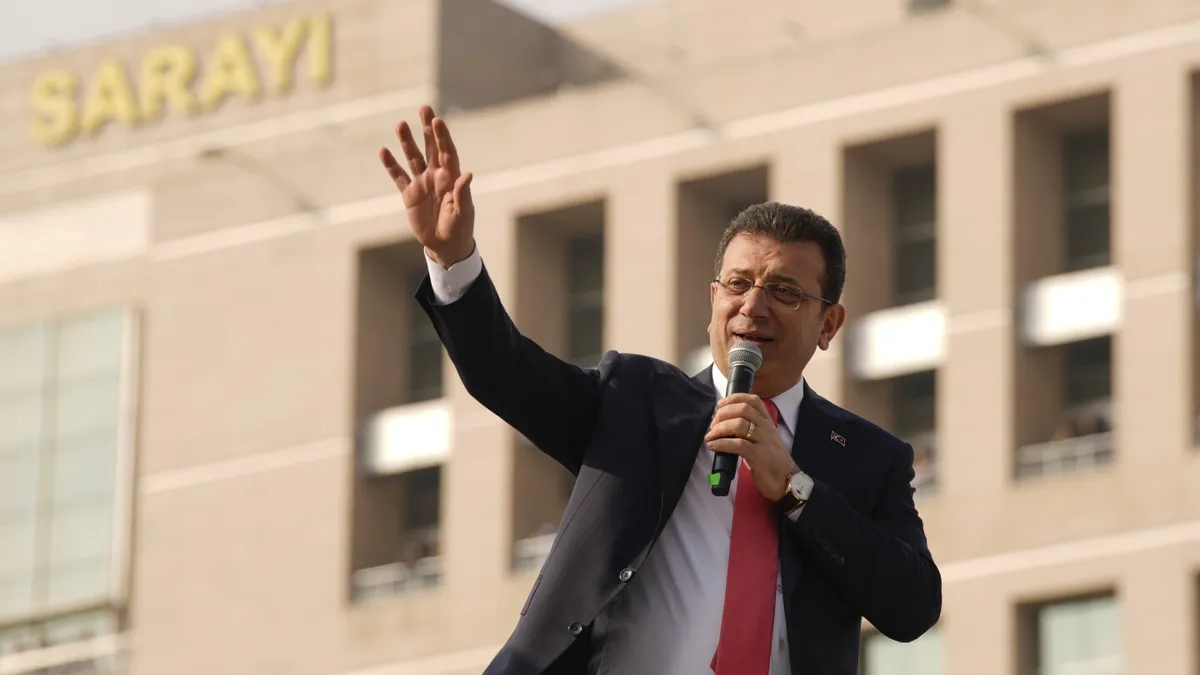
In a shocking turn of events, Turkish police arrested Istanbul’s mayor, Ekrem Imamoglu, on Wednesday as part of an extensive investigation into alleged corruption and supposed ties to terrorism. This arrest marks a significant escalation in the ongoing government crackdown on opposition and dissent in Turkey, particularly against key figures challenging President Recep Tayyip Erdogan.
The state-run Anadolu Agency reported that prosecutors had issued detention warrants not only for Imamoglu but also for approximately 100 other individuals. Among those detained was Imamoglu’s close aide, Murat Ongun. In a bid to suppress potential protests following the arrest, authorities closed several roads around Istanbul and imposed a four-day ban on demonstrations throughout the city.
Critics argue that this crackdown is a direct response to the significant losses suffered by Erdogan’s ruling party in local elections last year, amidst rising calls for early national elections. Despite these claims, government officials maintain that the judicial system operates independently and dismiss allegations of politically motivated legal actions against opposition figures.
The arrest occurred during a search of Imamoglu’s residence; however, it remains unclear whether police confiscated any items during the operation. The mayor’s wife, Dilek Imamoglu, shared with the private Now television station that police arrived at their home before dawn, taking her husband around 7:30 a.m.
In a further blow to the opposition, a day prior to the arrest, a university in Istanbul invalidated Imamoglu’s diploma, effectively disqualifying him from running in the next presidential race. Under Turkish law, possessing a university degree is a prerequisite for candidacy in elections. Imamoglu's party, the Republican People’s Party (CHP), was scheduled to hold a primary on Sunday to select its candidate for future presidential elections, with Imamoglu expected to be the frontrunner.
Although Turkey’s next presidential election is slated for 2028, the possibility of early elections looms large. Given the recent arrests, it seems increasingly unlikely that the planned vote will proceed as scheduled. “We are facing great tyranny, but I want you to know that I will not be discouraged,” Imamoglu stated in a video message shared on social media. He accused the government of “usurping the will” of the people.
In his statement on social media, Imamoglu declared, “The will of the people cannot be silenced through intimidation or unlawful acts. I stand resolute, entrusting myself not only to the 16 million residents of Istanbul but to the 86 million citizens of Turkey.”
The CHP’s chairman, Ozgur Ozel, condemned Imamoglu’s detention, labeling it a “coup” against the nation’s right to elect its next president. “Currently, there is a power in place to prevent the nation from determining the next president,” he remarked, emphasizing the seriousness of the situation.
Additionally, Turkey’s pro-Kurdish Peoples’ Equality and Democracy Party condemned the detentions, calling for the immediate release of all individuals taken into custody. Tulay Hatimogullari, the party’s co-chairwoman, described the dawn raid and the detention of the mayor as a “disgrace” that will resonate for generations, asserting that the operation undermines faith in justice and seeks to reshape politics through the judiciary.
As Imamoglu was arrested, Ongun, his aide, posted on social media expressing uncertainty about the situation. “They think they can silence us and prevent us from defending and supporting Ekrem Imamoglu,” he stated. “I entrust Ekrem Imamoglu to the Turkish nation. Protect, watch over and support him. They cannot defeat the nation.”
In another concerning development, police also detained prominent investigative journalist Ismail Saymaz for questioning, as reported by opposition-aligned Halk TV. Moreover, internet access advocacy group netblocks.org indicated that access to popular social media platforms has been restricted in Turkey following these events.
Imamoglu faces a multitude of legal challenges, including allegations that he attempted to influence a judicial expert investigating opposition-led municipalities. These cases could lead to severe penalties, including prison sentences and a potential political ban. He is also appealing a 2022 conviction for insulting members of Turkey’s Supreme Electoral Council, which poses additional risks to his political future.
Imamoglu was first elected as the mayor of Istanbul in March 2019, marking a historic victory against Erdogan and the ruling Justice and Development Party, which had maintained control over the city for 25 years. The party attempted to annul the election results, citing irregularities, but Imamoglu emerged victorious again in a repeat election just months later. His party continued to gain ground in local elections last year, intensifying the government’s crackdown on opposition figures.
As the political landscape in Turkey becomes increasingly fraught, the implications of these events for the future of democracy and civil rights in the country remain to be seen.